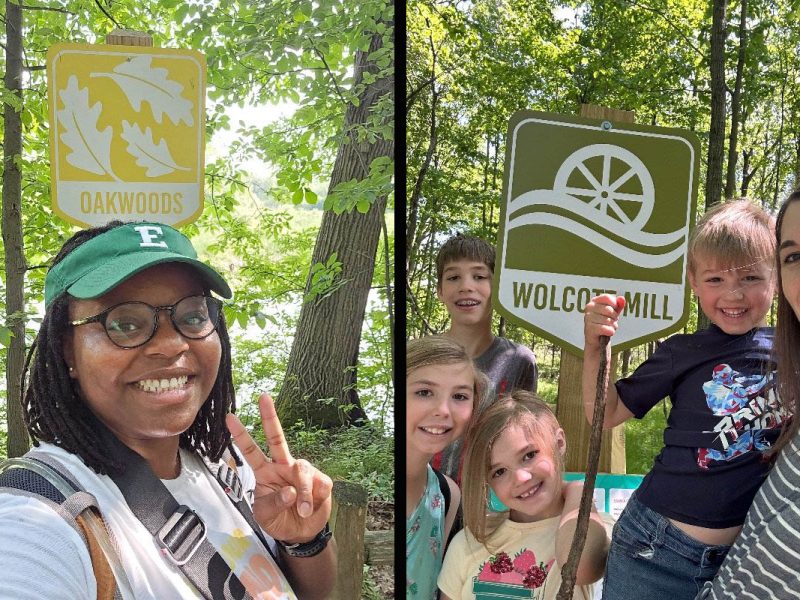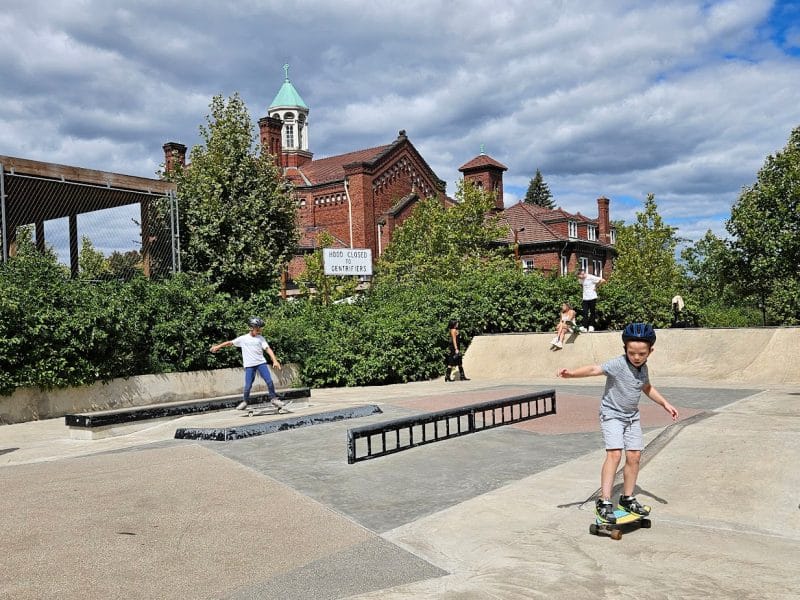‘We Felt the Loss of Them’: Fabric artist Evelyn Hoey honors gun violence victims in her own way
Detroit artist Evelyn Hoey’s new solo exhibition at Live Coal Gallery utilizes fabric and French knots to inspire conversations about the complexities of gun violence – and the all-too-common deaths that result from it every year.
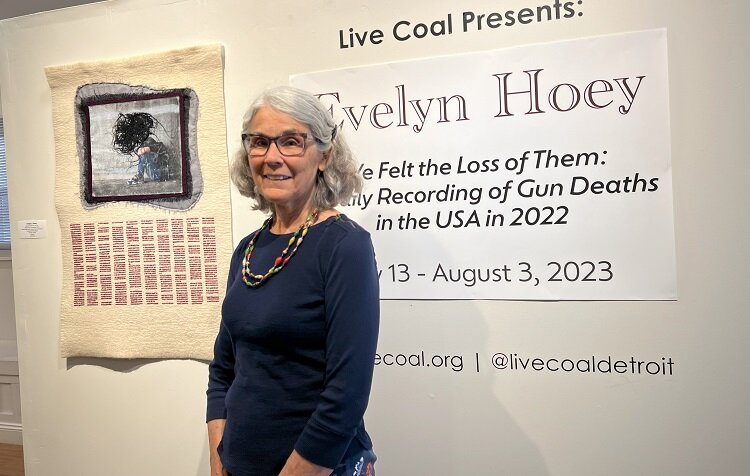
It’s around 10 a.m. on a Monday, and the mid-morning sun is spilling through the windows onto the wooden floors of the main room at Live Coal Gallery, near Detroit’s Piety Hill.
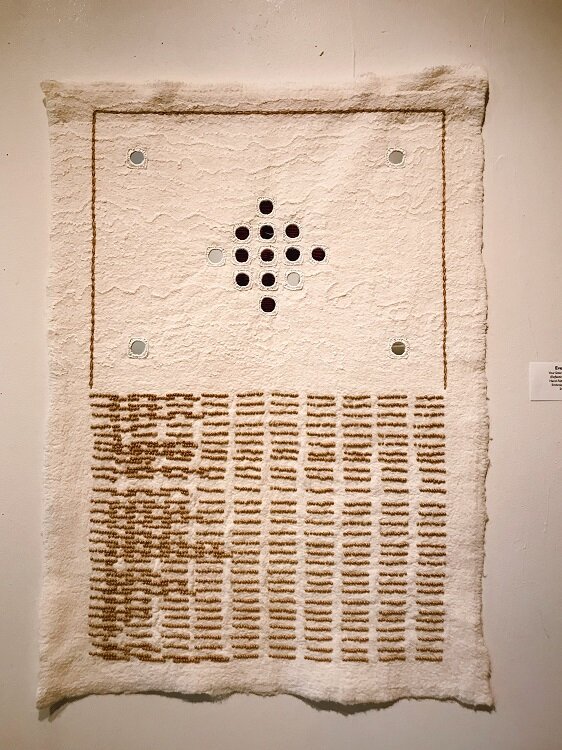
Situated on a bench to the left of a brick fireplace, fabric artist Evelyn Hoey (Editor’s note: Hoey is Model D contributor Sarah Williams’ mother) glances around at the 12 felted “calendars” she spent all last year stitching by hand for her first solo show, which opened earlier this month on July 13 – each piece commemorating a month’s worth of lives lost to a shared, and tragic, cause.
On view until Aug. 31, “We Felt the Loss of Them: A Daily Recording of Gun Deaths in the U.S.A. in 2022,” explores the issue of gun violence in America while remembering those who died last year because of it – a reality Hoey says she only became truly aware of recently after stumbling across statistics that left the Detroiter rattled.
“Early in 2021, I was reading an article on gun violence, and I became aware of the Gun Violence Archive website. When I went to that site and looked at what was there, I was floored. I had no idea that so many people are affected by gun violence in this country every year,” Hoey recalls, explaining that while mass shootings are typically widely reported, other gun-related deaths, like suicides and accidental shootings, are discussed less frequently – a phenomenon that left Hoey unaware of the real impact of gun violence for much of her life.
“When I became aware of this, I couldn’t just turn away and not do anything,” Hoey says.
And so, Hoey did what artists do: she used her gift of creative expression to share with others what she had learned.
Numbers – and French knots – as a representation of society’s trauma
According to the Gun Violence Archive, a website that archives gun violence statistics collected from over 7,500 sources each day including law enforcement, media, government and commercial, there were 44,357 gun-related deaths in the U.S. in 2022 – over half of them suicides. According to an interactive map on the archive’s website, 45 of those deaths occurred in the Metro Detroit area.
“We’re living in a lot of trauma. A lot of trauma. And so, I became aware of that – I wasn’t really aware of that even when I read the numbers,” Hoey says, noting that the experience of working on the twelve pieces in “We Felt the Loss of Them” was a learning experience.
To memorialize each of the lives lost to guns last year in America, Hoey tied French knots into twelve “calendars,” many of them hand-felted, every day in 2022, starting on Jan. 2 and ending on Jan. 1, 2023, representing the number of gun deaths reported that day by the gun archive. Divided by month, each piece represents one of the many facets of gun violence – including mental health issues, lost children, grief, and more. By the end of the year, Hoey had stitched 44,357 knots.
As the project progressed, Hoey reached out to Yvette Rock, a longtime friend and the founder and executive director of Live Coal, a nonprofit art gallery with a mission of “transforming lives and neighborhoods through art, community development, and education,” for advice on hanging the finished fabric pieces.
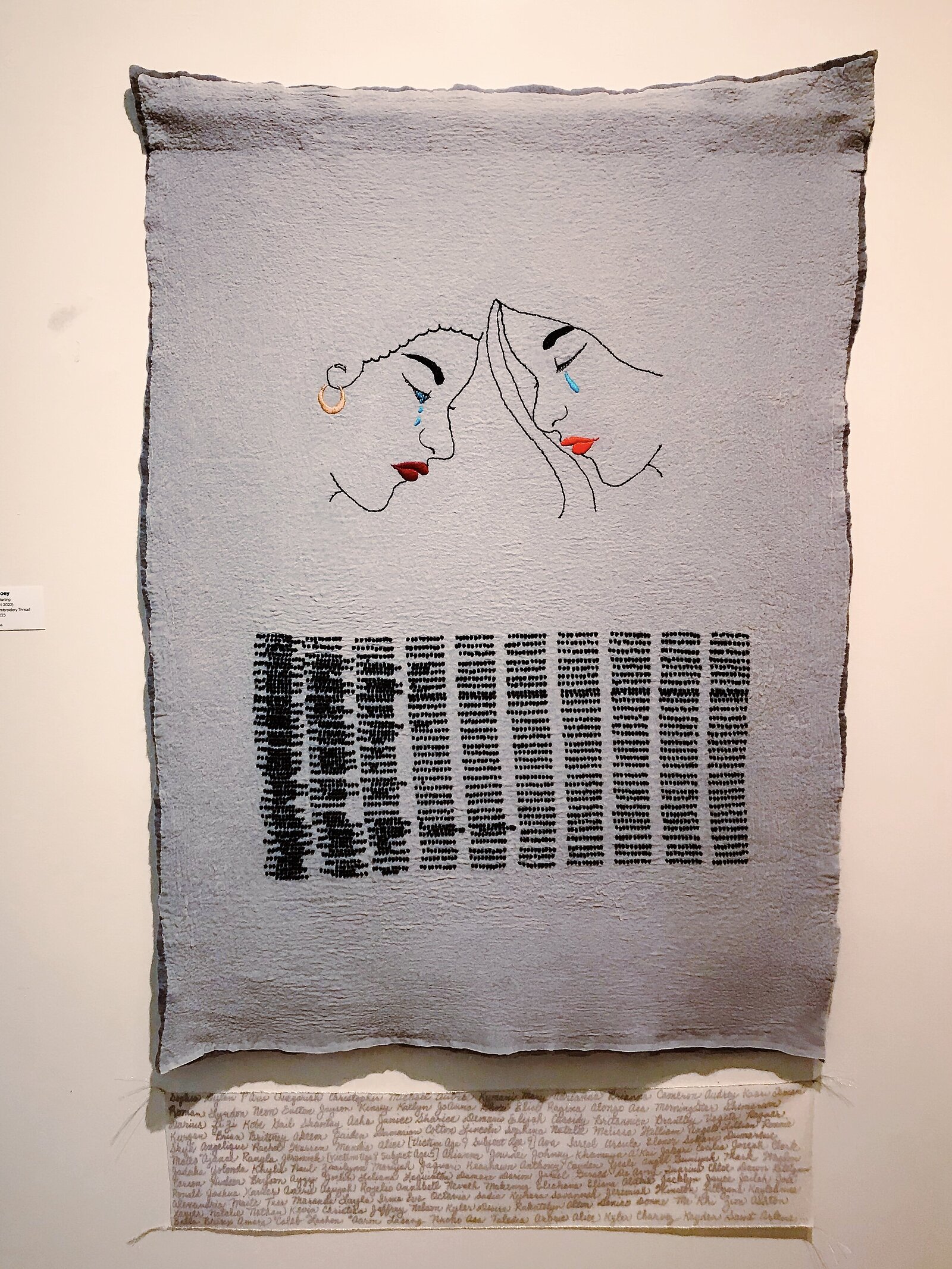
“The concept (Hoey) shared was one I had never heard of or exhibited. I thought about the impact this body of work might have and asked her if she would be interested in exhibiting with us in 2023. ‘We Felt the Loss of Them’ is a visually compelling body of work and, simultaneously, an eye-opening experience for those of us who have not known the facts about gun violence in America,” Rock says.
Rock says she viewed Hoey’s fabric art pieces as a “highly personal and effective medium” for conveying the realities of gun violence.
“The act of creating this work was very physical for Hoey – causing the artist physical pain in the making of it. She was able to deeply connect in ways one might not if using another medium. The choice, for her, was the one that would connect her most with the subject,” Rock says.
A society caught in the crossfire of fear
In the U.S., the issue of gun ownership has been contentious almost since our nation’s founding, its thorny history deeply interwoven with questions about power, race, and fear. Debates about the Second Amendment, which guarantees U.S. citizens the right to bear arms, range from calls for stricter limitations on gun ownership to calls for less restrictive gun ownership rights, with advocates often pointing to California’s 1967 Mulford Act, which effectively disarmed the Black Panther Party after its members conducted legal armed patrols in their neighborhoods to deter police violence.
Regardless of those controversies, Hoey says she isn’t interested in shaming gun owners or debating politics. Instead, “We Felt the Loss of Them” is meant to inspire compassionate conversations about gun violence and the ways people can prevent unnecessary gun deaths in their communities.
For Hoey, rising to that challenge requires society to overcome its fear – particularly of one another.
“We are the land of the free and the home of the brave, but we live in a lot of fear,” Hoey says, adding that she believes the fear of others is often at the root of gun violence – no matter if that violence is perpetrated by a civilian or by the police.
As a member of the Christian faith and former administrator of a small Christian school (a career she retired from before obtaining a B.F.A. in fiber arts from Wayne State University in 2020), Hoey says she is “disturbed” by some of the views espoused by fellow Christians about how we should respond to fear and violence – a concept she eloquently portrays in her piece “Topsy-Turvy/Jesus Didn’t Carry,” which features Bible verses promoting faith and courage over fear.
“I prayed for all of these people every day while I was making my knots,” Hoey says.
A tangled web
If there is anything “We Felt the Loss of Them” does exceptionally well, it’s acknowledging the nuances of gun violence in the U.S. – including the fear and grief of those who have experienced it first-hand.
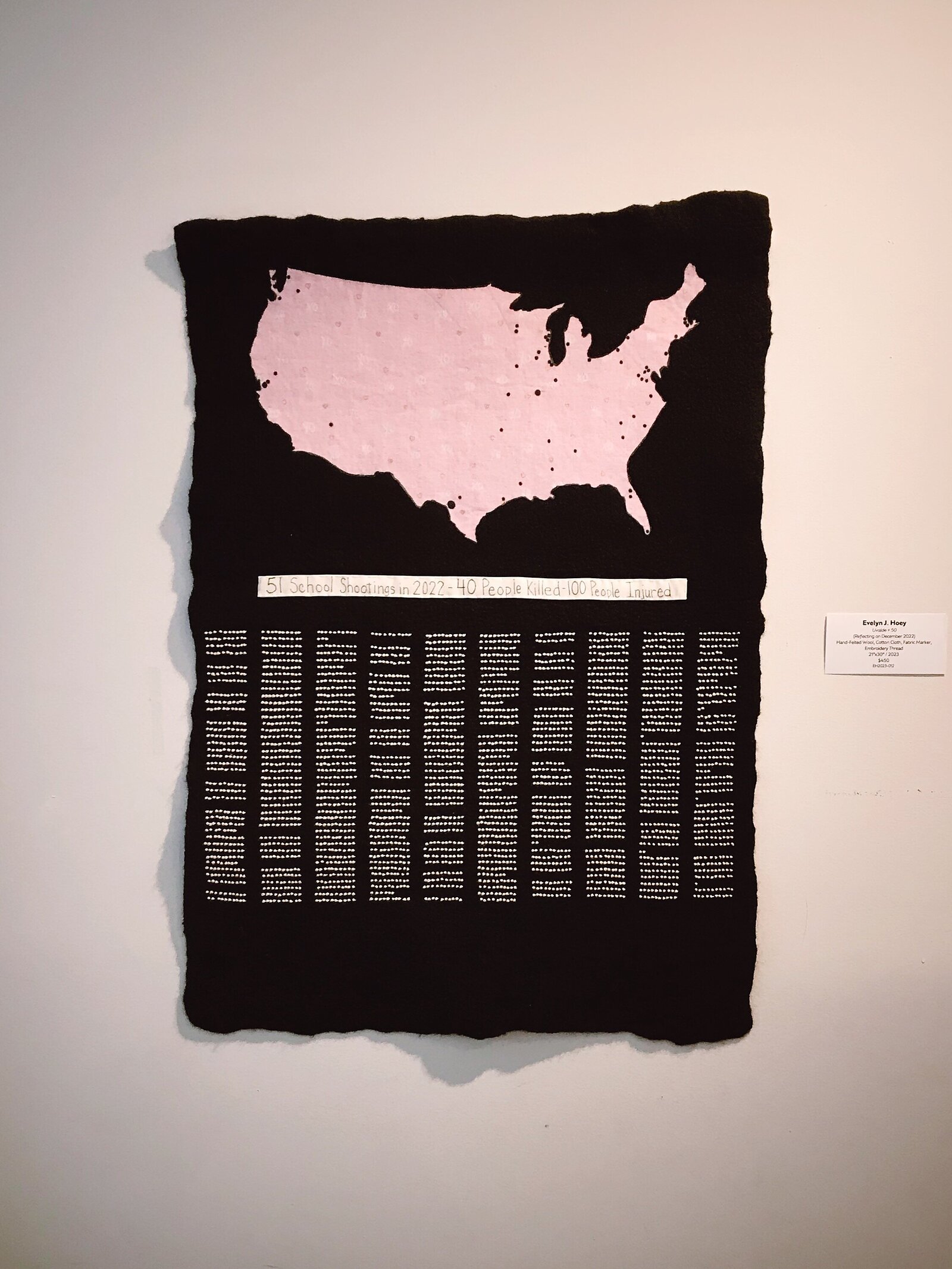
Among Hoey’s more powerful pieces are “Help Me Before It’s Too Late,” which depicts a person whose identity is shrouded by a tangle of dark threads, addresses mental health issues; “Uvalde +50,” which depicts school shootings in 2022; and “Some Mother’s Darling,” which features two crying mothers – a stark reminder that gun violence also affects those who are left behind.
“For every person [killed by a gun], there were a lot of other people exposed to this,” Hoey says.
Although Hoey is the first to admit she’s not an expert on gun violence, she believes there is no quick fix when it comes to solutions. The artist raises questions about the availability of assault weapons, children having access to unlocked guns at home, and limited restrictions on gun ownership in some states (in Michigan, a recently-passed package of gun reform bills included universal background checks and safe storage). Hoey also acknowledges that some of the burden rests on society, noting that reducing mental health stigmas and bolstering support for children and the mentally ill could help.
“In the communities where gun violence is more prevalent, people are living all the time with this. We need to make a concerted effort to address it,” Hoey says.
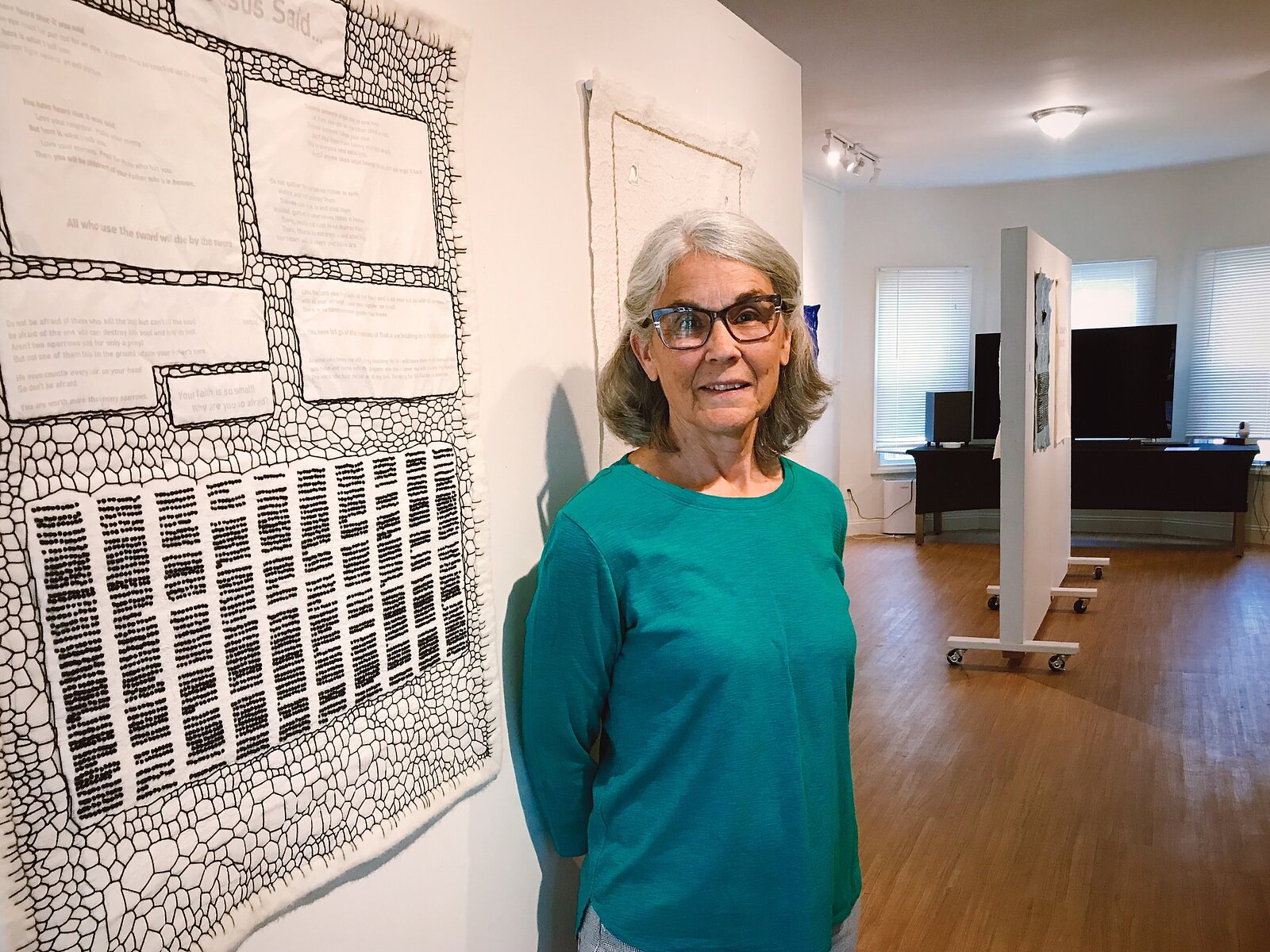
“We Felt the Loss of Them: A Daily Recording of Gun Deaths in the U.S.A. in 2022” will be on view at Live Coal until August 31, 2023, by appointment only. Live Coal will host an artist talk with Evelyn Hoey at the gallery on August 3 at 6:30 p.m. To see the exhibition, make an appointment by emailing admin@livecoal.org or by calling (313) 900-8392.
All photos by Erin Marie Miller unless noted.


